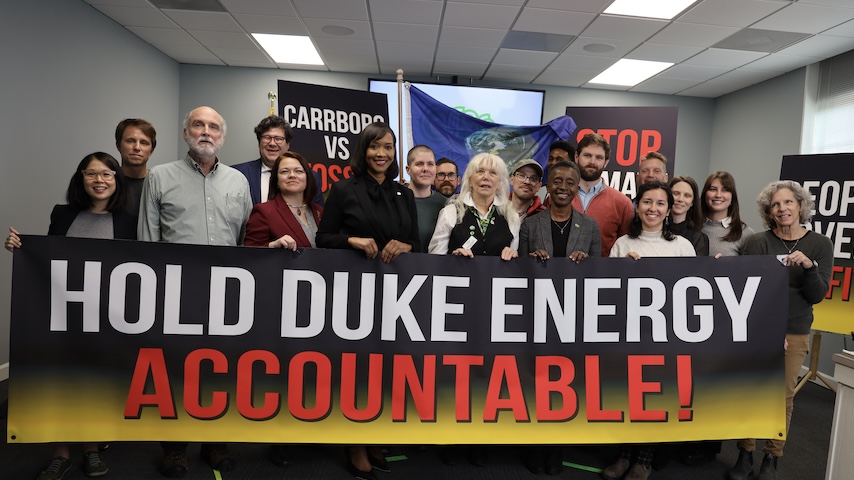Small Towns and Utility Companies Get in the Climate Change Lawsuits Game
Photo via Town of Carrboro, NC
The town of Carrboro, North Carolina — population 21,000 or so — filed a lawsuit against the utility giant Duke Energy this week, adding another layer to the onion-like collection of climate-related litigation still growing around the country. The town is alleging that Duke, which provides electricity to more than 8 million customers in North Carolina and five other states, played a leading role in a “nationwide climate deception scheme” that is now costing Carrboro residents millions thanks to increasing flooding and other impacts.
“Duke Energy’s knowledge of the environmental injustice being caused by the use of fossil fuels has unfairly plagued our community for decades,” said Carrboro mayor Barbara Foushee, in a press release. The lawsuit is requesting Duke pay for the damages to the town its actions continue to cause, though no specific amount is included.
The complaint, filed in Orange County Superior Court in Hillsborough, says that Charlotte-based Duke and its predecessor companies have known about the risks of climate change for more than half a century, but instead of working to address those risks it worked to conceal them from the public. By some measures, Duke remains one of the biggest greenhouse gas polluters in the country, behind only two other utilities, Texas-based Vistra Energy and Georgia-based Southern Company.
Most lawsuits alleging such long-term deceptive practices have been aimed at oil and gas companies. Most recently, Maine became the ninth state to sue ExxonMobil, Chevron, and other big oil companies for their role in worsening climate change impacts; utility companies, though, represent another important target. The Carrboro complaint notes that Duke officials were present at a 1968 conference where participants were warned that continuing to burn fossil fuels might “produce major consequences on the climate.” Decades later in 2000s, company reports were still raising questions about the science behind warming, going so far as to put ‘science’ in quotation marks.
“Climate action doesn’t stop at a national level, and Carrboro is holding Duke Energy and all fossil utilities’ feet to the fire,” said Jean Su, an attorney for the non-profit Center for Biological Diversity, who is advising the town on the case. “This town is paving a way for local governments to drive climate justice despite who’s in Washington.”
There is clearly a difference in scale if, say, California sues Big Oil, and a town of 20,000 wants a company to pay to keep up with climate impacts. But if Su is right that this offers something of a blueprint, then there are thousands of similar towns, all facing some version of those hazards, who might want to get in on the game. Duke Energy certainly can out-resource Carrboro, but maybe it can’t in the face of 100 or 1,000, or 10,000 similar claims.
Of course, they would have to win, or at least make a win seem likely. So far, none of the state or municipal suits have reached trial, and there is a dedicated cadre of both the industry and red state politicians out there doing all they can to keep it that way. But if the threat maybe pushes Duke or other big utilities, or the oil industry itself, toward even mildly climate-friendlier practices, it’s something.